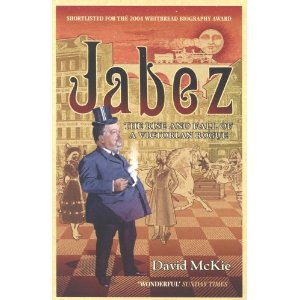Jabez: The Rise and Fall of a Victorian rogue
 David McKie’s Jabez: The Rise and Fall of a Victorian rogue has been rightly praised, including a Whitbread Biography Award shortlisting, for its fun and lively account based on meticulous research, rescuing a then famous Victorian scandal from the forgotten corners of history.
David McKie’s Jabez: The Rise and Fall of a Victorian rogue has been rightly praised, including a Whitbread Biography Award shortlisting, for its fun and lively account based on meticulous research, rescuing a then famous Victorian scandal from the forgotten corners of history.
What makes the book such a success is not only its own inherent qualities but also the choice of subject, someone whose actions and personality have been mirrored by many prominent figures since. It is a story of a larger-than-life character, full of affable charm and political success and also with a mean temper, running an apparently successful financial empire but only because the regulators and auditors were so woeful at discovering the truth, and who told the world what a supporter they were of virtuous causes whilst secretly swindling funds for their own personal use. That could be Robert Maxwell, it could be the chiefs of Enron, it could be the founders of WorldCom, it even has shades of Jeffrey Archer. Jabez may have been Victorian but his character type is timeless.
Like Horatio Bottomley, Jabez Spencer Balfour is a Liberal MP the party would rather forget. Not to be confused with the later Conservative leader Arthur Balfour, when Jabez became an MP there were already four other Balfours in the Commons, leading him to call himself Balfive. But it was his life outside Parliament that was really of interest.
For a time he seemed a fine campaigner for temperance, a successful businessman and a committed community man, both as a developer and gifting community resources such as a recreation ground. That recreation ground, given to Dorchester, shows both sides of his character – an apparently generous public act, rather undone when the villagers later received a demand for unpaid rent as in fact the recreation ground had not been owned by Jabez and was not his to give away.
He built up a complex network of companies, based around the Liberator Building Society which brought in the funds that were then shuffled around his commercial empire in increasingly desperate moves as his firms traded with each other and exchanged loans as an insufficient amount of capital was sent back and forth in more and more frantic attempts to stop the firms collapsing.
When they did, he fled to South America, providing another exciting chapter in his story as attempts were made to track him down and extradite him. The ambiguous legal position meant this was not simply a matter of exchanging legal arguments in a courtroom, complicated and bizarre though some of those were – including Jabez Balfour getting a sequence of friends to lay criminal charges against him, on the argument that he could not be extradited if he was facing such charges.
It also had a touch of the Wild West about it, including a high-speed train ride as detectives tried to spirit him away from extradition whilst those in pursuit tried to catch and stop them. At one point the train taking Jabez away ploughed straight on through a man on a horse who had stopped on the railway to stop the train. Instead, he and the horse were killed and the man responsible for the decision to keep the train going subsequently dodged an irate crowd by escaping through a toilet.
In one final modern twist, what happened after his highly publicised trial and jail sentence? On release he was whisked away by a newspaper who had agreed an exclusive deal for his memoirs. Very Victorian, very modern.
Buy Jabez: The Rise and Fall of a Victorian rogue by David McKie from Amazon here.
Leave a Reply